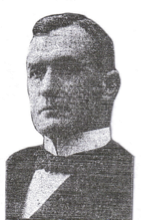Cecil Dwight Hine (1849 – 1920)

Attorney C.D Hine
His mother was Ellen Louise Montgomery of Coitsville, Ohio. She was the daughter of Robert Montgomery who in 1806 built and operated the Hopewell Iron Furnace. This furnace was the first to be built west of the Allegheny Mountains. (Remnants of this furnace may still be seen along the west bank of Yellow Creek about a mile downstream from the Village of Poland.) Samuel and Ellen were married in 1844.
When Cecil was born on August 3, 1849, his father was a merchant in Hubbard, Trumbull County, Ohio. Cecil was educated in the local schools and then entered Western Reserve College in Hudson, Ohio. He attended college and graduated with honors. He then began studying law with Taylor and Jones in Warren and was admitted to the bar in Trumbull County on April 15, 1872. That same year he married Elizabeth Woodruff of Poland, Ohio. Their only child, also named Elizabeth, was born in 1878.
In 1882 Cecil and his wife built a large home at 725 Wick Avenue. Mr. Hine was described by those who knew him only casually as having a reserve manner which gave the impression of coldness and sternness. However, his friend found him to be warm-hearted and generous. They also described him as free from political ambitions with a strong interest in athletics. In his college years Cecil played catcher for the Poland Resolutes and later first baseman on the first semi-profession baseball team known as the Mahoning Baseball Club. Mrs. Ellen Hine maintained a gracious home and Mr. Hine enjoyed working in his garden. The young couple entertained frequently in what was then the fashionable part of Youngstown. (The house was demolished in the mid-1970s.)
Mr. Hine practiced law in Youngstown with John H. Clarke. Hine and Clarke handled the first steel mergers in the valley when Youngstown Iron and Steel and Cartwright & McCurdy merged with American Steel. A series of articles published in 1925 under the title “Knowing Youngstown” contained a segment on the organization of the Youngstown Sheet and Tube Company and its proposed location. It relates that in the late summer of 1900 land along Crab Creek was being considered for the construction of the steel mill, but careful surveys proved this land lacked sufficient water. “It was largely owing to the vision of the late Cecil D. Hine that the present site of the plant at Campbell was secured. It contained 300 acres and fronted on both the river and railroads.”
Probably one of Mr. Hine’s closest friends was James A. Campbell, president of Youngstown Sheet and Tube Co. He said, “Mr. Hine was the most valuable man in the early days of Sheet and Tube. He was not only a splendid lawyer but he had that quality and asset so few attorneys had, a good, general business knowledge.” Mr. L. A. Manchester, counsel for Sheet and Tube in later years, said Mr. Hine was a pioneer in handling legal work which made the valley’s big institutions possible. He also said, “Mr. Hine had the greatest analytical mind I ever met. He always went direct to his point. He was the soul of honor, integrity and uprightness. He hated trickery, underhanded methods, dishonesty and sham.”
Perhaps the greatest tribute was paid Mr. Hine by his law partner from 1886 to 1897, Justice John H. Clarke of the Supreme Court of the United States. Justice Clarke noted the prominent role played by Mr. Hine in the life of the community. “For forty years he was the chief and most trusted legal adviser who originated and conducted the really great business enterprises of the Mahoning Valley and whose wise business judgment and foresight is written in the organization, extension and consolidation papers of the great companies now operating in the Valley.”
Mr. Hine was one of the incorporators of the Mahoning Valley Historical Society in 1909 and was the author of its articles of incorporation. He had many other interests, serving as a Rayen School trustee in 1883 and as trustee when the Mahoning County Law Library Association was set up in 1904. He served at one time as president of the Holland Land Co., the holding corporation for the Youngstown Country Club in 1912. It is said he had numerous real estate holding in downtown Youngstown and a farm at Haselton.
In the last few years of his life Mr. Hine experienced a gradual decline in health. As was his custom for many years he spent part of his winters in Pasadena, California with his daughter. It was there that he suffered a fatal heart attack on February 22, 1920. Funeral services were held March 2, 1920 in Youngstown with his burial in the Riverside Cemetery in Poland. In respect for its director, the general offices of the Youngstown Sheet and Tube were closed. Members of the Mahoning County Bar Association attended the funeral in a body and all the principal attorney’s offices were closed. Honorary pallbearers included Poland’s Judge J. B. Kennedy and Dr. Carson R. Justice.
The bulk of Mr. Hine’s estate – more than $1,000,000 – was left to his wife. The estate included a wide variety of stocks and real estate holdings. Following the death of her husband, Mrs. Hine took an active part in a number of community philanthropies. She traveled extensively with her daughter, spending winters in California and summers in New England and Europe. She died at the family residence on Wick Avenue on September 23, 1927 and was buried with her husband of 48 years.
Cecil had one sister, Mary Wick Hine, who was born in 1846. She married twice, first to James Phelps and then to Allen Cameron. Very little is known of her life.
